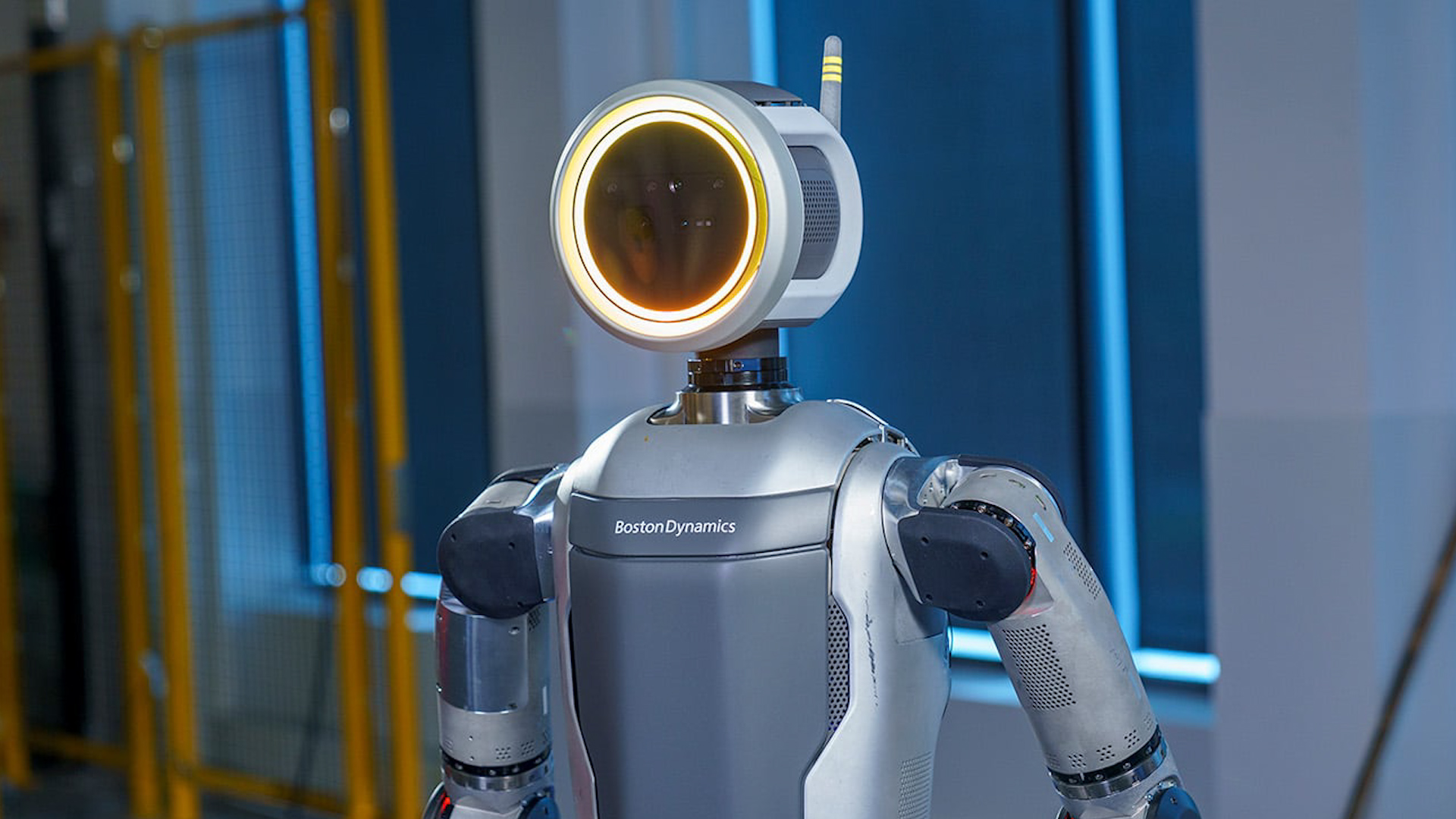
Atlas robot shows off full autonomy in latest Boston Dynamics demo
By Craig Nigrelli (Anchor), William Jackson (Producer), Kaleb Gillespie (Video Editor)
Boston Dynamics released a new video Wednesday, Oct. 30, showcasing the latest capabilities of its humanoid robot, Atlas, which now operates without human oversight. In a simulated industrial environment, Atlas autonomously performs tasks such as moving engine parts between containers and sequencing dollies, using advanced machine learning and sensor technology to detect, grasp and position items.
Media Landscape
See how news outlets across the political spectrum are covering this story. Learn moreBias Distribution
Left
Right
Untracked Bias
Unlike many robotics demonstrations, Atlas operates without pre-programmed steps or real-time human control. Boston Dynamics says the robot can dynamically respond to changes in its environment, adjusting its approach if, for example, a part doesn’t fit as expected.
This adaptability is powered by a combination of camera-based sensors, force sensors and advanced software, enabling Atlas to detect and refine its actions in real time.

Download the SAN app today to stay up-to-date with Unbiased. Straight Facts™.
Point phone camera here
This level of autonomy contrasts with Tesla’s Optimus robot, which has shown reliance on remote human operators for guidance.
In October, Boston Dynamics announced a partnership with the Toyota Research Institute (TRI) to further enhance Atlas’ capabilities with TRI’s behavior models, enabling the robot to quickly adapt to complex tasks required in factory settings.
These models, similar to large language models, allow Atlas to learn physical tasks with reduced training needs and improved durability on the job.
The newest model of Atlas is fully electric, a shift from its previous hydraulic system, allowing for smoother and more precise movements. Supported by Hyundai, Boston Dynamics sees this collaboration with TRI as a significant step toward developing flexible, humanoid robots capable of performing everyday industrial tasks.
Get up to speed on the stories leading the day every weekday morning. Sign up for the newsletter today!
Learn more about our emails. Unsubscribe anytime.
By entering your email, you agree to the Terms & Conditions and acknowledge the Privacy Policy.
CEO Robert Playter described the initiative as focused on creating robots that can handle a wide range of tasks in manufacturing and beyond.
Tesla CEO Elon Musk has predicted that by 2040, the global market will include at least 10 billion humanoid robots priced between $20,000 and $25,000. While Atlas marks a leap forward, experts say its long-term success depends on achieving affordability, durability, and scalability to make widespread industrial applications feasible.
[CRAIG NIGRELLI]
BOSTON DYNAMICS IS SHOWCASING NEW CAPABILITIES IN ITS HUMANOID ROBOT, ATLAS, – NO LONGER NEEDING HUMAN OVERSIGHT. IN VIDEO RELEASED WEDNESDAY – THE ROBOT IS SEEN TAKING ON TASKS AUTONOMOUSLY IN A SIMULATED INDUSTRIAL ENVIRONMENT. ATLAS IS SHOWN MOVING ENGINE PARTS BETWEEN CONTAINERS AND SEQUENCING DOLLIES, RELYING ON ADVANCED MACHINE LEARNING AND SENSORS TO DETECT, GRASP, AND REPOSITION ITEMS.
UNLIKE MANY ROBOTICS DEMOS, ATLAS OPERATES WITHOUT HUMAN OVERSIGHT OR PRE-PROGRAMMED STEPS. BOSTON DYNAMICS SAYS ATLAS DYNAMICALLY RESPONDS TO CHANGES IN ITS SURROUNDINGS — RE-EVALUATING ITS APPROACH IF A PART DOESN’T FIT AS EXPECTED. THIS ADAPTABILITY RELIES ON A COMBINATION OF CAMERA-BASED SENSORS, FORCE SENSORS, AND ADVANCED SOFTWARE, ALLOWING ATLAS TO DETECT, ADJUST, AND REFINE ITS ACTIONS ON THE FLY. THIS LEVEL OF AUTONOMY STANDS IN CONTRAST TO TESLA’S OPTIMUS, WHICH HAS BEEN SHOWN TO RELY ON REMOTE HUMAN OPERATORS FOR CONTROL.
BOSTON DYNAMICS RECENTLY PARTNERED WITH THE TOYOTA RESEARCH INSTITUTE, OR TRI, TO ADD ADVANCED AI TO ITS ATLAS ROBOT. THE COMPANIES SAY THE COLLABORATION IS ABOUT BRINGING TRI’S POWERFUL BEHAVIOR MODELS INTO ATLAS, SO IT CAN ADAPT AND RESPOND QUICKLY TO COMPLEX FACTORY TASKS.
ATLAS’ LATEST MODEL IS NOW FULLY ELECTRIC, DITCHING HYDRAULICS FOR SMOOTHER, MORE PRECISE MOVEMENTS.
BACKED BY HYUNDAI, BOSTON DYNAMICS SEES THIS PARTNERSHIP WITH TRI AS A BIG STEP TOWARD CREATING FLEXIBLE HUMANOID ROBOTS DESIGNED FOR REAL-WORLD WORK. CEO ROBERT PLAYTER SAYS IT’S ALL ABOUT DEVELOPING ROBOTS THAT CAN HANDLE EVERYDAY TASKS IN MANUFACTURING AND BEYOND.
TESLA CEO ELON MUSK PREDICTS THAT BY 2040, THERE WILL BE AT LEAST 10 BILLION HUMANOID ROBOTS PRICED AROUND $20,000 TO $25,000. EXPERTS AGREE ATLAS IS A SIGNIFICANT LEAP, BUT THEY NOTE THAT ITS LONG-TERM SUCCESS WILL DEPEND ON AFFORDABILITY, DURABILITY, AND SCALABILITY FOR WIDESPREAD INDUSTRIAL USE.
FOR MORE OF OUR STRAIGHT FACTS REPORTING, DOWNLOAD THE STRAIGHT ARROW NEWS APP OR VISIT US AT SAN – DOT – COM.
Media Landscape
See how news outlets across the political spectrum are covering this story. Learn moreBias Distribution
Left
Right
Untracked Bias
Straight to your inbox.
By entering your email, you agree to the Terms & Conditions and acknowledge the Privacy Policy.
MOST POPULAR
-
 Getty Images
Getty Images
Judge allows CNN lawsuit potentially worth billions to continue
Read16 hrs ago -
 Reuters
Reuters
It’s a bird, it’s a plane, it’s the first video of Alef Aeronautics’ flying car
Watch 2:1317 hrs ago -
 Getty Images
Getty Images
Democrats in Congress receive lowest approval rating in Quinnipiac poll history
Watch 2:5918 hrs ago -
 Getty Images
Getty Images
AG Bondi reviewing Epstein documents for release, could hold client list
Watch 1:4818 hrs ago




